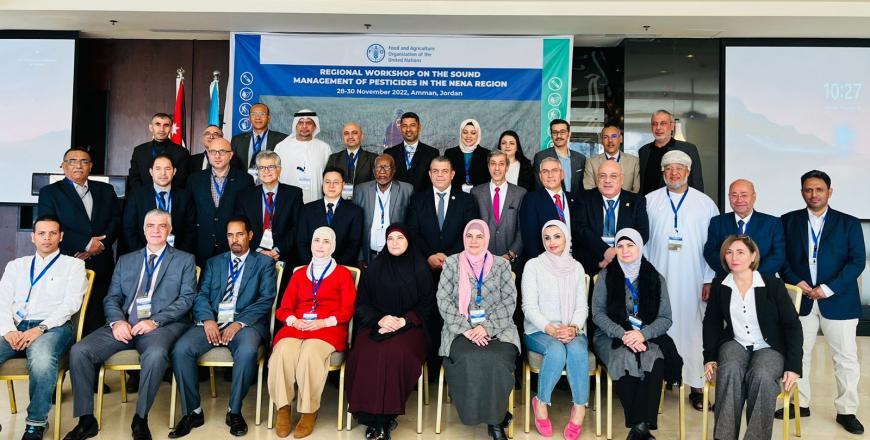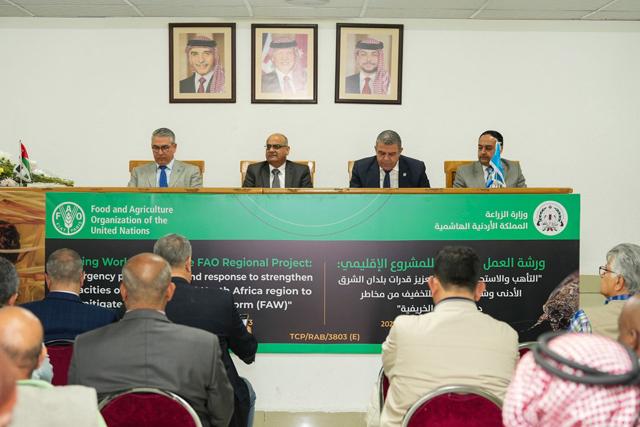AMMAN — The Food and Agriculture Organisation of the United Nations (FAO) is holding a regional workshop on the Sound Management of Pesticides in the Near East and North Africa (NENA) region over the course of three days, from November 28 through 30 in Amman.
The workshop is held in cooperation with the FAO Plant Production and Protection Division (NSP) and the Ministry of Agriculture of the Hashemite Kingdom of Jordan, according to a statement from FAO.
The workshop aims to identify priorities and proposals for the capacity development of pesticide management in the region, as well as to enhance the capacity of participants to register pesticides and exchange information and experiences on pesticide management.
The workshop will discuss identifying gaps and needs to update the legal framework and institutional capacities for pesticide management. Pesticides can pose a serious threat to human health and the environment, cause adverse effects on food security and are a major source of water and soil pollution, the statement said.
Thaer Yaseen, Regional Plant Protection officer at FAO Office for the Near East and North Africa, stressed that capacity-building programmes in the field of pesticide registration and management are essential to enhance the technical capacities of government officials involved in the regulation and management of pesticides in ministries of agriculture, environment and health.
"The regional workshop contributes towards developing a plan to better support sustainable pesticide management in the region by national officers. Involving regional officers and expressing the views of the countries will ensure that the interventions are sustainable actions to the challenges and needs of the countries of the region,” Yaseen added.
During the workshop, participants will receive training on the International Code of Conduct on Pesticide Management and Guidelines for Pesticide Quality Control and Advertising.
They will also receive guidelines on compliance and enforcement of a pesticide regulatory programme, as well as guidelines for the registration of microbial, botanical and semi-chemical pesticides.
The training also touches on Highly Hazardous Pesticides (HHP) in the region, to mitigate their risks.
“The challenges facing farms worldwide, and the Jordanian farmer, in particular, are increasing as he suffers from a lack of resources, scarcity and high costs of production inputs, in addition to global climate change,” said Abdel Wali Al Tahat, Assistant Secretary-General for Plant Health, deputising for Agriculture Minister Khalid Hneifat.
"The Ministry of Agriculture is fully aware of the importance of true partnership between the public and private sectors, especially international companies specialised in the field of agricultural pesticides, which are based on research and development in advancing the reality of the agricultural sector and the modernity and technology it offers. By providing an attractive environment, Jordan is considered a haven for such companies, both from a legislative point of view, and by allowing sample imports intended for experimental purposes, research needs, development and sponsorship of initiatives,” added Tahat.
"Pesticides play an important role in the agricultural sector, achieving food security and improving farmers' livelihoods," elaborated FAO Representative to Jordan Nabil Assaf.
"However, the negative effects of pesticides on the environment, beneficial non-target organisms, and human health are often much greater than the benefits of using pesticides to control pests and diseases,” he added.
FAO Regional Office for Near East and North Africa intensively assessed the current status of health and technology projects in the region, the statement said.
The report showed that 89 HHPs are still in use in some NENA countries, 50 of which were evaluated under the Globally Harmonised System of Classification and Labelling of Chemicals (GHS).
According to the report, 39 of the 89 HHPs are identified under criteria 8, which indicates active substances and pesticide formulations that show a high incidence of severely harmful effects on human health or the environment.
Many countries in the NENA region have made efforts to effectively manage the use of pesticides by developing regulations, ratifying international agreements, and adopting Integrated Pest Management (IPM) programmes to reduce reliance on pesticides.















